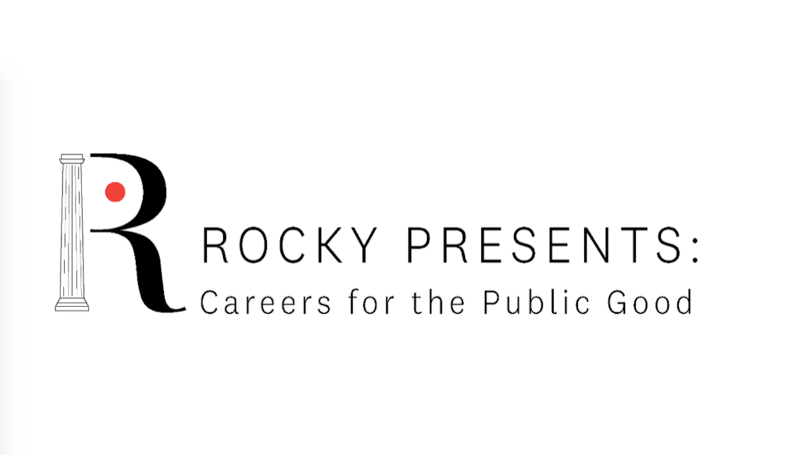
- Public Policy
- Leadership
- Funding
- News & Events
- About the Center
Back to Top Nav
Back to Top Nav
Back to Top Nav
Back to Top Nav
On Monday, July 13th, 2020, Mike Belinsky ’08, a manager in Bridgespan Group’s New York Office and cofounder of Instiglio, an NGO working to alleviate global poverty; Zak Kaufman ’08, Co-Founder and CEO of Vera Solutions, an award-winning cloud and mobile technology firm with a focus on social impact; Sanat Mohapatra ’20, the founder of Unmasked, an anonymous, mental health social media mobile application for college students; and Anna Stork ’08, the co-founder of LuminAID Lab, which develops innovative solar-powered products for disaster relief, humanitarian aid, and recreational use outdoors; joined Dartmouth students in a Rockefeller Center-hosted virtual panel on careers in the public good.
The panelists discussed their backgrounds and what prompted them to get involved in social enterprise before offering advice to the event attendees.
Belinsky, who was a Government and Economics double-major, dryly described his initial career path as typical of many Dartmouth students, joining “the best consulting firm that would take me” after graduation. After paying off some of his student loans, he attended the Harvard Kennedy School and got a policy degree. At Harvard, he and some like-minded friends founded Instiglio, a firm dedicated to the alleviation of global poverty. More recently Belinsky joined Bridgespan, where he advises nonprofits and foundations.
Belinsky encourages current Dartmouth students to seek “proximity” to problems, offering his experience in a development economics course he took as an example. Belinsky found the class interesting, but many of the theoretical concepts he learned in the course never clicked until he became a Paganucci Fellow and studied microfinance in developing countries. In other words, Dartmouth students should find ways to put their learning into practice and develop a firsthand understanding of the problems they study.
Kaufman, who “didn’t have a passport” when he first arrived at Dartmouth, embarked on a globe-trotting career in social impact once he graduated. He began his work at the nonprofit Grassroots Soccer in South Africa, and while working there he developed innovative techniques to collect and analyze the data on the organization’s activities. Soon, Kaufman realized that he could market these skills to nonprofits around the world, leading him to found Vera Solutions, which employs 70 staff around the globe.
Kaufman points to a Dartmouth-sponsored trip he took to practice medicine in Nicaragua as profoundly shaping his professional ambitions. While Kaufman’s team could ably cure many of the ailments they encountered, their patients would frequently become sick again due to structural problems like a lack of clean drinking water. By the end of the trip, Kaufman was “disillusioned with this idea of bringing the best of western medicine into rural Nicaragua,” and was eager to find systemic solutions to these health issues.
Mohapatra, who graduated from Dartmouth as an English major this spring, noticed many fellow students struggling with mental health problems during his freshman year of college. Recognizing that there weren’t many safe, easily accessible spaces on campus for these students to reach out for support, Mohapatra launched the app Unmasked in January 2020. Unmasked is a forum for college students to anonymously reach out for support from other members of the community. So far, the app has 2,500 users and is operating on 9 college campuses. Mohapatra will spend this next year at Dartmouth as a Lombard Fellow, and is continuing to expand the Unmasked community.
Mohapatra has been stretched by the project, describing that while first developing the app he “definitely lost all sense of work life balance.” Now, however, he is directing a team of developers, which he says has “been such an effective way to reduce my personal workload and empower everyone in the organization.” Launching and managing Unmasked has taught Mohapatra about “teamwork, leadership, and actually building an organization.”
Finally, Stork, who was an engineering major, always knew that she wanted to make an impact. While getting a master’s degree in architecture from Columbia, Stork heard about Haiti’s disastrous 2011 earthquake and resolved to do something about it. Crucially, many of the refugee camps that Haitians were housed in after the earthquake didn’t have reliable electricity or lighting. Seeing a need, Stork “ended up designing the LuminAID Light.” The light can pack flat and has a solar panel and a lithium ion battery attached to it, allowing its users to have access to light in any setting. Since securing an investment from Mark Cuban on Shark Tank in 2015, the company has expanded and distributed over a million lights around the world.
Stork advises students to not be thrown off in their professional lives when “there is a lot of push from outside people to think really big and to dream up a solution.” In fact, one of “the most challenging things [about running an organization] is just to shift your mindset to really think about the step-by-step things that you need to get done.” While it’s not exciting, on a day-to-day basis that’s “actually what’s most important.”
The Rockefeller Center thanks these distinguished panelists for sharing their experiences working for the public good and is inspired by what they have achieved.
-Written by Ben Vagle ’22, Rockefeller Center Student Program Assistant for Public Programs
You can view a recording of the panel here.